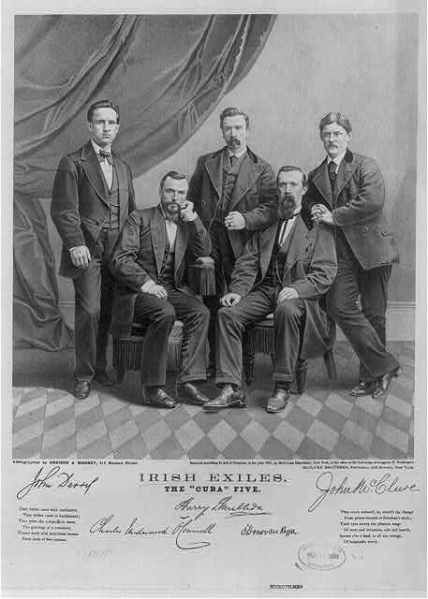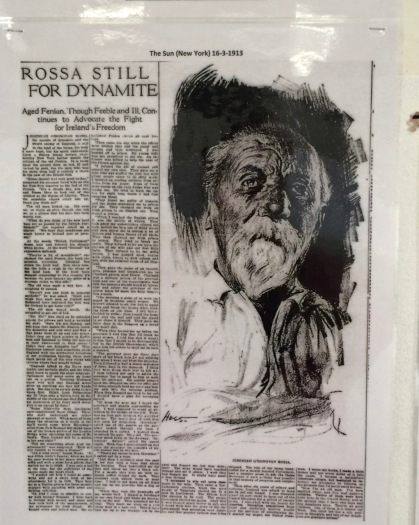The world was shocked this week by appalling acts of terror. Terrorism is rightly and universally condemned in modern Ireland – and yet this year we celebrated the centenary of the death of a man whom many, including his fellow patriots, denounced as a terrorist in his lifetime while others hailed as a hero.
Our American and Canadian readers might be surprised at how relevant his story is to their own countries.
I write of course of Jeremiah O’Donovan Rossa of Skibbereen, the ‘Unrepentant Fenian’, whose state burial in 1915 was the occasion of a fiery speech by Patrick Pearse that is commonly seen as a catalyst to the 1916 Rising. In March Back in Time I introduced him and wrote about the awful background that turned him into a revolutionary – the death of his father from famine fever and his family’s eviction and departure from Ireland. To the end he refused to call the cataclysmic events of 1845 to 1850 a famine: there was no shortage of food, he pointed out, just a shortage of humanity. It fired in him a lifelong hatred of British rule which hardened through terrible treatment in prison and which he brought with him to exile in America, where he and his fellow Fenians were accorded a hero’s welcome.
The Fenian brotherhood Rossa joined in America in 1870 had organised several raids on Canadian communities during the 1860s and early 70s. All were unsuccessful, but resulted in loss of life and a worsening of relationships between Canada and America, seen as harbouring and tolerating Fenian activity. The raids involved hundreds of Fenians, many of them battle-hardened veterans of the American Civil War. (For more on the Irish in the American Civil War – the numbers and the stories will amaze you – see Damian Shiels’ meticulously researched blog and website.)
According to this article on the Fenian Raids:
Ironically, though they did nothing to advance the cause of Irish independence, the 1866 Fenian raids and the inept efforts of the Canadian militia to repulse them helped to galvanize support for the Confederation of Canada in 1867. Some historians have argued that the affair tipped the final votes of reluctant Maritime provinces in favour of the collective security of nationhood, making Ridgeway the “battle that made Canada.”
Embracing this militaristic approach, Rossa became as notorious an extremist in America as in Ireland. He founded a newspaper, The United Irishman, to propagate his views and raise funds for his infamous skirmishing fund. This fund, in fact, was to pay for a bombing campaign carried out in Britain from 1881 to 1885, causing injuries and deaths (to civilians, including children) – and real terror.
One of the exhibits in Skibbereen this summer consisted of newpaper clippings from American newspapers about Rossa, amply testifying to his notoriety. The top right clipping consists of snippets about Well Known People – Rossa is listed alongside William Morris, Geronimo and the Csar Of Russia
In many ways O’Donovan Rossa encapsulates a central dissonance at the heart of Irish History: he was a passionate patriot who believed in armed struggle, while many of his contemporaries espoused a pacifist (see Michael Davitt as a prime example – he referred to Rossa as O’Donovan Assa) or parliamentary approach and saw Rossa’s campaign of violence as undermining their objectives. Now, in 21st Century Ireland, we are faced with the dilemma of how to deal with historical figures who are both important markers in the struggle for independence and echoes of a violent past many no longer wish to glorify.
In Skibbereen this summer Rossa was celebrated in several ways. We attended not just the March, but a play, two exhibitions, a lecture, and the grand opening of a refurbished park in Rossa’s honour by Michael D Higgins, the President of Ireland. In Dublin his 1915 state funeral and graveside oration were given a full scale re-enactment, attended by the President, the Prime Minister (Taoiseach) and many dignitaries.

We toured Glasnevin Cemetary on Dublin this summer. The tour included a recital of Patrick Pearse’s oration at the grave of O’Donovan Rossa
To give you a flavour for how Rossa is revered as a hero watch this YouTube clip – the ultra-nationalist ballad features Pathé News footage of the actual funeral.
But not everyone felt that it was appropriate for the Irish government to underwrite such commemorations. This was expressed well by the historian, Carla King writing to the Irish Times. She summed up thus:
…while O’Donovan Rossa is a figure for whom we can feel some pity, his philosophy, with its commitment to mindless and counter-productive violence, launched a tradition of which we should be ashamed.
Another historian, Marie Coleman wrote:
It was unclear whether the focus of the event was Rossa himself or the significance of the funeral as signifying the rejuvenation of republicanism as a precursor to the Easter Rising. If the former, the State’s endorsement of an archaic form of irredentist Irish nationalism will sit uncomfortably with many in 21st-century Ireland and with unionist opinion in Northern Ireland.
Like many Irish people growing up in the 50s and 60s I was brought up on stories of the epic Fight for Irish Freedom, although in my family’s case it was also complicated by ancestry on both sides of the divide. In that narrative, Rossa was one in a long line of heroic freedom fighters. To dig a little deeper still into the story of O’Donovan Rossa, I went looking for signs of the man himself around Skibbereen and found them in some surprising places. My next post will relate to Rossa’s time in Skibbereen and the legacy he left in this West Cork town.










Thoughtful piece Finola and I’ll be interested in your follow up.
LikeLiked by 1 person
I have read and re-read the exchange with Patrick. I curb my reaction by offering that to suggest O’Donovan Rossa was not a terrorist is the meanest insult ever levelled at him. He learned the hard way and used the only tool by which the downtrodden can focus the spotlight of public opinion on their plight. The fact that latter day terrorists appear to be pawns of power hungry shadows must not detract from the honourable intent of this great man, no more than the heroic patriots of 1916 should be judged against the self seeking marionettes who claim to represent the Irish people today.
LikeLike
Dear Finola and Robert
Thankyou again for your weekly treats and keeping the yearning for West Cork bubbling away.
I wondered if there are any plans for the Rock Art Exhibition to come any closer to Skibb/Ballydehob after its season finishes in February.
Regards
Jeff Wright
LikeLike
Hi Jeff. There’s been talk… If it turns into anything more we will be posting about it! By the way, I hope you saw our wildflower posts – know you’re a fellow observer.
LikeLike
Ridiculous headline.
LikeLike
Hi Patrick, I bet our readers would be interested in hearing more.
LikeLike
I’d expect such a sound bite headline from an english tabloid not from a west cork publication. How can you compare a 19th century freedom fighter to the cold blooded cowards who murder innocent civilians? Ridiculous!
LikeLike
Excellent, interesting and left me waiting for part 2.
R
LikeLike
Next week…unless I get sidetracked.
LikeLike
And the new Navigation is superb – I’ve enjoyed revisiting lots of things
LikeLike
Oh good – it’s working, then.
LikeLike
There’s always more than one version of a story – a thoughtful and interesting piece. And a very timely discussion.
LikeLike
Thanks, Amanda – I’ve still more to write about him, next week I think.
LikeLike